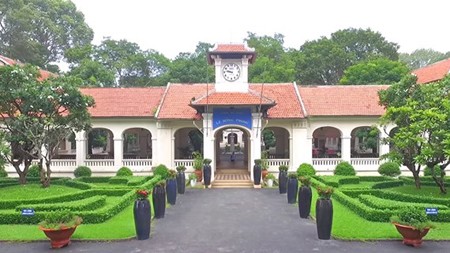
In the conference, Deputy Director of the Department Nguyen Van Hieu shared that the Department is preparing a plan to help teachers timely update necessary knowledge and skills for the experimental implementation of ‘smart school’.
If approved by HCMC People’s Committee, the supposed model will be piloted in the academic year 2018-2019 in Le Hong Phong High School for the Gifted and Tran Dai Nghia High School as well as some primary schools, junior high schools, and high schools in District 1 and District 12.
This is the educational preparation step in the project of ‘turning Ho Chi Minh City into a smart city in the period from 2017-2020, vision to 2025’.
The smart school will operate on the basis of applying information and communication technologies into management and organization of educational activities.
In particular, a class is built on the foundation of online interaction where teachers usually use digital lessons via an interactive whiteboard, open educational resources, simulation software, and virtual laboratories.
Learners are equipped with tablets to study online, use smart libraries, and enter STEM classrooms. Their education-related information, including attendance checking, personal academic record, and academic notice, is synchronized.
Leaders of many high schools stated in the conference that the model ‘smart school’ would have very positive effects on learners. However, they also voiced their concern over the feasibility of the project because there is a serious lack of finance for sufficient educational equipment to use in this kind of school.
Vice principal of a high school in Binh Thanh District said that at the moment, most high schools still exercise the traditional teaching method, with the aid of modern projectors to make lessons more exciting. Hence, when witnessing a lesson being supported by moving 3D pictures of virtual reality, even he was deeply impressed, let alone students.
The problem is that the price of such a pair of virtual reality glass is not at all cheap enough for schools to deliver to each learner.
Concerns of teachers do have their own logic since only a short time ago, HCMC Department of Education and Training had a plan to implement ‘smart educational cards’ (with impressive features like checking attendance, collecting school fee, managing personal finance, becoming bus or library tickets) on a large scale. Yet the project is left undone although it seems even more feasible than the ‘smart school’ project.
What is more, the Department wants to pilot the new project in modern schools which have high school fee because they can limit the number of students in a class to around 30-35 people, possess sufficient state-of-the-art equipment, and have qualified teaching staff.
If the new project is to be applied, will there be more pressure on teachers when they have to update more knowledge and skills? Will they be able to cope with so many changes happening simultaneously but without clear focus? Most importantly, will learners truly benefit from repeated piloted projects with no effective improvement from weaknesses?
























